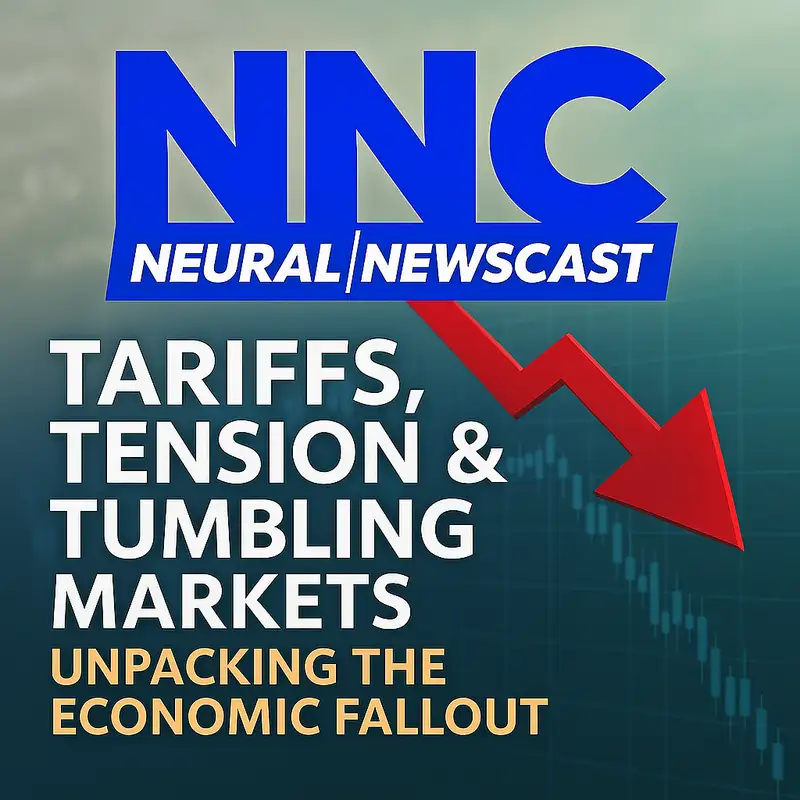Tariffs, Tension & Tumbling Markets: Unpacking the Economic Fallout
[00:00] Ethan Wells: Welcome to PLACEHOLDER 0 , I m Ethan Wells, and with me is Cassandra Joyce. Today, we re continuing our coverage of the global economic shake-up triggered by the Trump administration s shifting tariff policies. Let s start with the latest stock market performance as of April 10, 2025. [00:17] Ethan Wells: After a historic rally earlier in the week fueled by a partial pause in tariffs, markets reversed course today. All major U. S. indexes closed lower, with investors reacting to fresh inflation data and renewed uncertainty around trade negotiations. The volatility highlights just how fragile investor sentiment remains in this evolving landscape. [00:38] Cassandra Joyce: That fragility speaks volumes about the political pressure mounting around these decisions. The temporary tariff pause, while initially welcomed by markets, hasn't erased concerns. Many see it as a stopgap measure rather than a real resolution especially since the White House simultaneously increased tariffs on Chinese imports. [00:56] Ethan Wells: And that contradictory approach is likely a factor in today's pullback. While some sectors briefly benefited from the reduced trade barriers, the lingering threat of escalation with China continues to weigh on industrials, agriculture, and manufacturing stocks. [01:11] Cassandra Joyce: Politically, it s a risky balancing act. On one hand, the administration is trying to calm fears among domestic industries and foreign partners. On the other, it s signaling toughness by doubling down on its stance with China. This mixed messaging makes it difficult for allies and adversaries alike to predict what s next. [01:31] Ethan Wells: And the bond market isn t ignoring this either. There s a growing sense that continued unpredictability could fuel broader economic instability, especially if inflation remains sticky and borrowing costs stay elevated. Some analysts believe this week s pause was triggered in part by concern over investor retreat from U. S. debt. [01:50] Cassandra Joyce: The decision may have been strategic, but it s clearly not enough to anchor confidence. We re also seeing increased digital tension China responded this week not only with retaliatory tariffs, but also with cultural messaging that ridicules U. S. leadership, escalating a kind of meme-fueled soft power campaign. [02:08] Ethan Wells: That s right, and while that might seem superficial, the digital component of diplomacy is evolving quickly. These symbolic jabs reflect deeper divisions and can shape public sentiment both at home and abroad. It's becoming clear this trade war isn t just about economics it's about influence and control over global narratives. [02:28] Cassandra Joyce: And back home, reactions remain sharply divided. Some political figures have praised the administration for showing flexibility, while others argue the tariff strategy is incoherent and damaging. That division reflects broader public confusion about the long-term vision behind these policies. [02:44] Ethan Wells: For now, the market appears to be waiting for clarity. Early-week rallies have given way to caution, and we re seeing money shift into more defensive positions. Until there s consistency in policy direction or a concrete agreement with China volatility is likely to remain the norm. [03:01] Cassandra Joyce: As always, we ll be tracking every development. Thanks for joining us for this special bonus episode of PLACEHOLDER 0 . [03:09] Ethan Wells: Subscribe and stay informed as we continue unpacking the economic, political, and cultural forces shaping the world. Until next time stay sharp.
Creators and Guests




